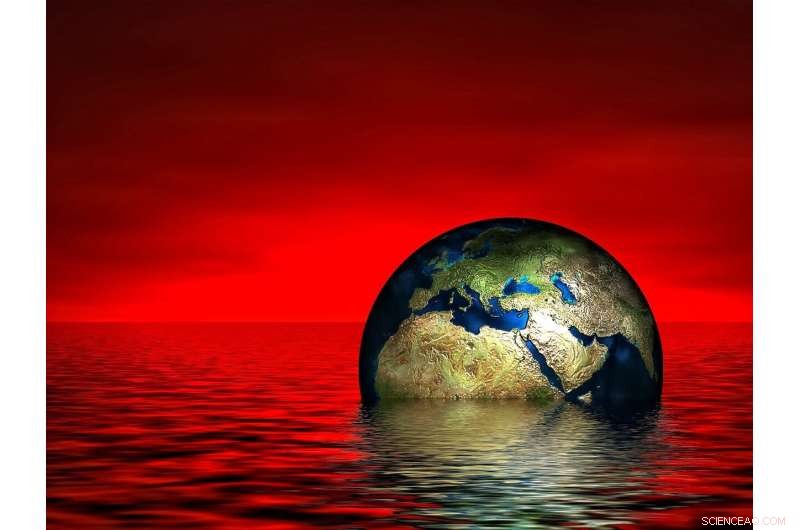
Crédito:Pixabay/CC0 Dominio público
"Crisis" es una palabra increíblemente poderosa, por lo que es interesante presenciar la forma en que la frase "crisis climática" se ha convertido en parte de la lingua franca.
Una vez asociada solo con unos pocos científicos y activistas "abiertos", la frase ahora se ha generalizado.
Pero, ¿qué entiende la gente por el término "crisis climática"? ¿Y por qué importa?
La incorporación de la conversación de crisis
No son solo los activistas o los científicos los que dan la voz de alarma.
El secretario general de la ONU, Antonio Guterres, ahora emplea de manera rutinaria frases dramáticas como "cavar nuestras propias tumbas" cuando habla del clima. Bill Gates nos aconseja evitar el "desastre climático".
Esta integración lingüística marca líneas de batalla rediseñadas en las "guerras climáticas".
El negacionismo está en retirada. El debate sobre el cambio climático ahora es sobre qué se debe hacer y por quién.
Los científicos, utilizando toda la autoridad de su profesión, han sido clave para cambiar el discurso. Los autores principales de los informes del Panel Intergubernamental sobre el Cambio Climático (IPCC, por sus siglas en inglés) ahora no se andan con rodeos y hablan abiertamente sobre hambrunas masivas, extinciones y desastres.
Estas figuras públicas claramente esperan impulsar a los ciudadanos, las empresas y los gobiernos a una acción climática radical.
Pero para mucha gente común, el cambio climático puede parecer algo alejado de la vida cotidiana. No es una "crisis" en la forma inmediata que lo ha sido la pandemia.
Por supuesto, muchos creen que los expertos en clima han subestimado el problema durante demasiado tiempo.
Y, sin embargo, la nueva ubicuidad de términos de sirena como "crisis" climática, "emergencia", "desastre", "avería" y "calamidad" no garantiza ninguna comprensión compartida, y mucho menos creíble, de su posible significado.
Esto es importante porque tales términos tienden a polarizarse.
Pocos dudan ahora de la realidad del cambio climático. Pero la forma en que describimos sus implicaciones puede repetir fácilmente enfrentamientos anteriores entre "creyentes" y "escépticos"; "realistas" y "traficantes de miedo". El resultado es aún más inercia política y estancamiento.
Tendremos que hacerlo mejor.
Cuatro ideas para un nuevo camino a seguir
Términos como "crisis climática" llegaron para quedarse. Pero los científicos, los maestros y los políticos deben ser inteligentes. Una aguda conciencia de lo que otras personas pueden pensar cuando nos escuchan gritar "¡crisis!" puede conducir a una mejor comunicación.
Aquí hay cuatro ideas para tener en cuenta.
1. Debemos desafiar las narrativas distópicas y de salvación
Una crisis es cuando las cosas se desmoronan. Vemos informes de noticias de crisis todos los días:inundaciones en Pakistán, colapso económico en Sri Lanka, hambruna en partes de África.
But "climate crisis" signifies something that feels beyond the range of ordinary experience, especially to the wealthy. People quickly reach for culturally available ideas to fill the vacuum.
One is the notion of an all-encompassing societal break down, where only a few survive. Cormac McCarthy's bleak book The Road is one example.
Central to many apocalyptic narratives is the idea technology and a few brave people (usually men) can save the day in the nick of time, as in films like Interstellar.
The problem, of course, is these (often fanciful) depictions aren't suitable ways to interpret what climate scientists have been warning people about. The world is far more complicated.
2. We must bring the climate crisis home and make it present now
Even if they're willing to acknowledge it as a looming crisis, many think climate change impacts will be predominantly felt elsewhere or in the distant future.
The disappearance of Tuvalu as sea levels rise is an existential crisis for its citizens but may seem a remote, albeit tragic, problem to people in Chicago, Oslo or Cape Town.
But the recent floods in eastern Australia and the heatwave in Europe allow a powerful point to be made:no place is immune from extreme weather as the planet heats up.
There won't be a one-size-fits-all global climate crisis as per many Hollywood movies. Instead, people must understand global warming will trigger myriad local-to-regional scale crises.
Many will be on the doorstep, many will last for years or decades. Most will be made worse if we don't act now. Getting people to understand this is crucial.
3. We must explain:a crisis in relation to what?
The climate wars showed us value disputes get transposed into arguments about scientific evidence and its interpretation.
A crisis occurs when events are judged in light of certain values, such as people's right to adequate food, healthcare and shelter.
Pronouncements of crisis need to explain the values that underpin judgements about unacceptable risk, harm and loss.
Historians, philosophers, legal scholars and others help us to think clearly about our values and what exactly we mean when we say "crisis."
4. We must appreciate other crises and challenges matter more to many people
Some are tempted to occupy the moral high ground and imply the climate crisis is so grand as to eclipse all others. This is understandable but imprudent.
It's important to respect other perspectives and negotiate a way forward. Consider, for example, the way author Bjørn Lomborg has questioned the climate emergency by arguing it's not the main threat.
Lomborg was widely pilloried. But his arguments resonated with many. We may disagree with him, but his views are not irrational.
We must seek to understand how and why this kind of argument makes sense to so many people.
Words matter. It's vital terms like "crisis" and "calamity" don't become rhetorical devices devoid of real content as we argue about what climate action to take.
Este artículo se vuelve a publicar de The Conversation bajo una licencia Creative Commons. Lea el artículo original. How can dermatology take action against climate change?
